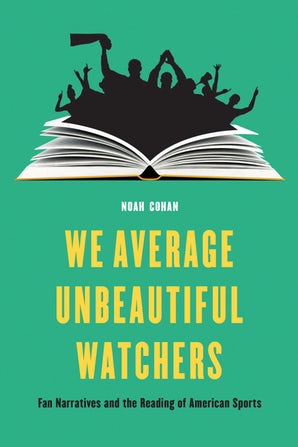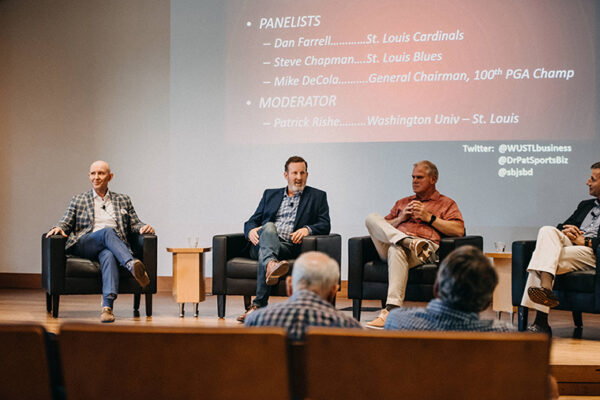Sports fandom — often more than religious, political or regional affiliation — determines how millions of Americans define themselves.
In his new book, “We Average Unbeautiful Watchers: Fan Narratives and the Reading of American Sports,” Noah Cohan, lecturer in American Culture Studies in Arts & Sciences at Washington University in St. Louis and founding coordinator of the American Studies Association’s Sports Studies Caucus, examines contemporary sports culture.
He shows how mass-mediated athletics are actually richly textured narrative entertainment, rather than merely competitive displays.
While it may seem that sports narratives are “written” by athletes and journalists, Cohan seeks to show that fans are not passive consumers but rather function as readers and writers who appropriate those narratives and generate their own stories in building their sense of identity.
Here, Cohan discusses some of the book’s themes, including advice for one long-suffering Cubs fan.
What is it about sports that captivates us so deeply?
Our attraction to sports is grounded in their dual appeal to our craving for group membership, which team sports readily provide via regional or institutional affiliation, and as a platform for the articulation of our individual identities, which we craft ourselves by identifying our favorite players or particular storylines.

As David Foster Wallace pointed out in “How Tracy Austin Broke My Heart,” which I analyze in the introduction to my book, sports also satisfy our desires for quantifying success, via statistics and the final score, and qualifying physical excellence, via our judgements of the athletes’ impressive and often aesthetically or even erotically pleasing physiques. So I would say it’s not one thing, but many.
You write that sporting events themselves are narratives, though not often recognized as such. How does our interpretation of the facts of the game influence our enjoyment of it?
People most often consider sporting events as “real” because they involve the co-participation of multiple individuals whose performance does not have a predetermined ending — this is the fundamental premise of competition of course. And they are real!
But their “realness” and lack of predetermination does not change the fact that they are fundamentally similar to any other narrative based entertainment, like a novel, movie or television show. Every sporting event has a beginning, middle and an end, a collection of characters, and a story-arc that ebbs and flows toward a climax and denouement. And just like any other narrative, you can read a sporting event however you want.
But because of the “realness” of sports, and the fact that the final score overdetermines how most people consider any given sporting event by designating a “winner” and “loser,” most people think of sports as fundamentally different from other narrative entertainments.
I argue that if we open up our thinking to consider sports more like “Harry Potter” or “Star Wars” and adjust our fan behavior to match, that we can be more creative readers and re-writers of sport. To do so, we have to recognize that athletes are both characters in our personal fan narratives and real sentient individual humans whose priorities will not always map onto the story arcs we are hoping they’ll construct.
When fans assume, or even demand, that the latter should match the former is when we run into trouble. But if we recognize that bifurcation, fans can realize their agency and denaturalize a lot of the assumptions we have about competitive dominance, gender, injury, players’ rights and a host of other issues that are usually taken for granted or adjusted to prevailing norms because of the “reality” of the sporting context.
I’m a rabid Chicago Cubs fan. Am I crazier than the average person?
Ha! I would say you’re not crazier, no. But, at least until 2016, Cubs fans were perhaps more attuned to modes of fandom that aren’t premised on competitive dominance.
I would say that many, maybe even most, tortured fanbases benefit from an expanded range of storytelling wrought by futility. I’m a Seattle Mariners fan, so I know this phenomenon well. Longest playoff drought in the Big Four men’s sports leagues!
Think of all the narratives that attempted to explain the Cubs’ century of struggles: the billy goat, the black cat, “Bartman.” Or Cubs fans’ reputation for going to day games in droves just to enjoy the atmosphere, even when the team is terrible.
When the storylines available to fans don’t include the promise of playoffs this season, or even moderate success anytime soon, it forces more creativity among those fans who don’t, and probably never will, jump off the bandwagon, so to speak.
Those creative stories endear those fanbases to the larger body of sports fans too, I think.
So I guess I’d say, presuming the Cubs don’t go on another 108-year drought, don’t ask yourself if you’re crazy for liking the team. Ask yourself if your narrative attachment to the team is over-determined by its success, or lack thereof. And if it is, mix it up.


